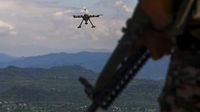In a dramatic escalation of tensions between India and Pakistan, explosions were reported near Srinagar International Airport on the evening of May 9, 2025, amid a series of drone attacks originating from Pakistan. The situation has prompted the suspension of civilian flight operations at the airport until midnight on May 15, as authorities implement countermeasures to neutralize the drone threat.
Sources told ABP News that blasts were heard near the airport shortly after similar explosions rocked parts of Jammu. Indian military forces are actively engaging multiple Pakistani drones spotted over various locations, including Samba, Pathankot, Amritsar, Jaisalmer, and Barmer. Defence officials confirmed that Indian Air Defence Systems successfully brought down between six to eight of these drones over Srinagar as part of ongoing military operations.
In response to the drone threat, mosque loudspeakers in Srinagar warned locals to switch off their lights as a precautionary measure. This call for caution came as explosions were reported near the Awantipora air base in south Kashmir, further heightening fears in the region.
Chief Minister Omar Abdullah took to social media platform X to confirm the blasts and the ensuing blackout in Jammu. He posted, "Blackout in Jammu now. Sirens can be heard across the city," and noted intermittent sounds of blasts, likely from heavy artillery. Abdullah urged residents to stay indoors and avoid spreading unverified information.
This escalation follows a significant military engagement on May 7, when India conducted precision strikes targeting terror infrastructure in Pakistan and Pakistan-occupied Kashmir (PoK). These strikes were a direct response to an April 22 attack in Pahalgam, Jammu and Kashmir, where 26 people, mostly tourists, lost their lives. The aftermath of these events has seen a marked increase in military readiness and operations along the Line of Control (LoC).
As the evening unfolded, reports indicated that a blackout had been enforced across several districts in Punjab, including Ferozepur, Pathankot, Amritsar, and Hoshiarpur, following the sound of loud explosions and air raid sirens. Locals in these areas reported hearing blasts in Gurdaspur and Tarn Taran, although there was no official confirmation regarding the cause of these noises.
Prime Minister Narendra Modi convened a high-level meeting with Defence Minister Rajnath Singh, External Affairs Minister S. Jaishankar, National Security Advisor Ajit Doval, and the three service chiefs to assess the situation and strategize on the next steps. The urgency of the meeting reflects the critical nature of the ongoing conflict and the need for a coordinated response.
In a separate incident in Punjab's Ferozepur, three individuals sustained burn injuries due to a Pakistani drone attack. Local police reported that most of the attacking drones had been neutralized by the Indian Army, highlighting the effectiveness of the military's response to the aerial threat.
According to military sources, during the night of May 8 and 9, Pakistan launched between 300 and 400 Turkish drones across 36 locations in an unsuccessful attempt to target Indian military installations. The Indian Army accused Pakistan of using civilian aircraft as a shield for these aerial assaults, endangering commercial flights in the region.
As tensions continue to rise, the situation remains fluid, with military operations ongoing in Srinagar, Awantipora, and Budgam. The Indian military is on high alert, and residents are advised to remain vigilant as the threat of further drone attacks looms.
The events of May 9 serve as a stark reminder of the fragile peace in the region and the potential for conflict to escalate rapidly. With both nations on high alert, the international community watches closely, hoping for a de-escalation of hostilities and a return to dialogue.






